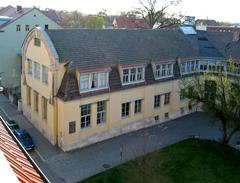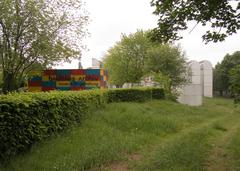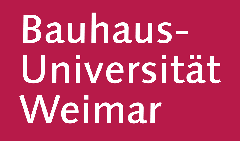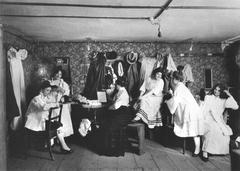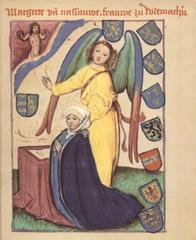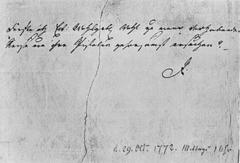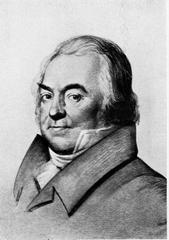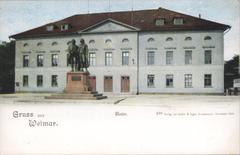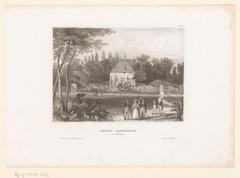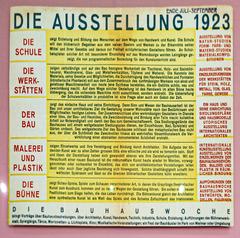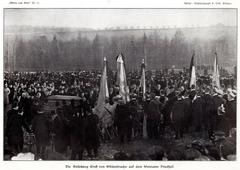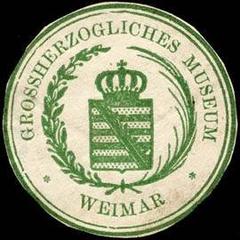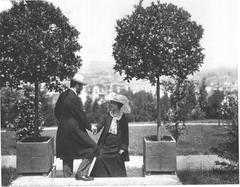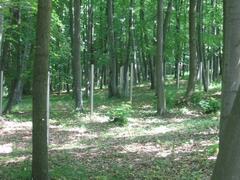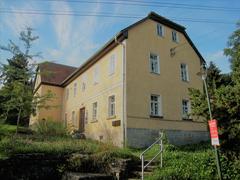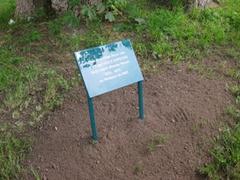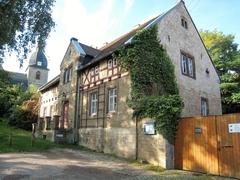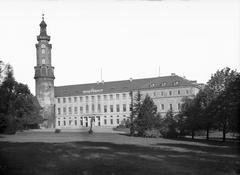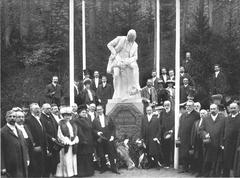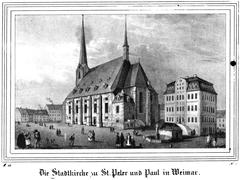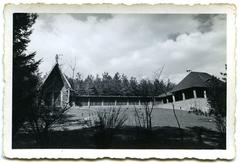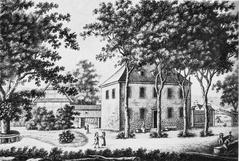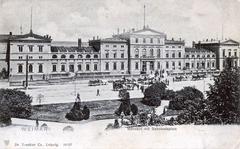Classical Weimar Visiting Hours, Tickets, and Historical Sites Guide
Date: 14/06/2025
Introduction to Classical Weimar: History and Cultural Significance
Classical Weimar, located in the heart of Germany’s Thuringia region, stands as a beacon of European culture and intellectual history. Renowned for its transformative impact on literature, philosophy, and the arts, Weimar is recognized as a UNESCO World Heritage site, representing the cultural flourishing known as Weimar Classicism (circa 1758–1826). During this period, under the enlightened patronage of Duchess Anna Amalia and Duke Carl August, Weimar evolved from a provincial ducal seat into a vibrant center of Enlightenment thought, artistic innovation, and literary achievement. Prominent figures such as Johann Wolfgang von Goethe, Friedrich Schiller, Johann Gottfried Herder, and Christoph Martin Wieland left enduring legacies that shaped both German and European cultural landscapes (Klassik Stiftung Weimar, Germany Travel, Wikipedia: Weimar Classicism).
The city’s cultural richness is preserved in its architecture, museums, literary archives, and scenic parks, many of which are part of the UNESCO-listed “Classical Weimar” ensemble. Major sites include the Goethe National Museum, Schiller’s House, and the Duchess Anna Amalia Library with its iconic Rococo Hall. Additionally, Weimar’s influence extends into modernist history through its association with the Bauhaus movement, offering a unique blend of tradition and innovation (UNESCO World Heritage, onlyingermany.com).
This comprehensive guide equips visitors with essential information on Weimar’s leading historical sites, visiting hours, ticketing details, notable cultural figures, travel tips, and special events. Whether you’re a literary enthusiast, architecture admirer, or festival goer, you’ll find all you need to experience this remarkable city (Klassik Stiftung Weimar, tallgirlbigworld.com).
Table of Contents
- Discover Classical Weimar: A Must-Visit Cultural Destination
- Historical Evolution of Classical Weimar
- Key Figures of Classical Weimar
- Visiting Classical Weimar: Essential Information for Tourists
- Enduring Legacy and UNESCO Recognition
- Frequently Asked Questions (FAQs)
- Exploring Classical Weimar: Sites, Hours & Tickets
- Top Historical and Cultural Attractions: Hours, Tickets & Tips
- Complete Guide to Visiting, Transportation, and Local Information
- Summary of Key Visitor Information and Travel Tips
- References and Official Links
Discover Classical Weimar: A Must-Visit Cultural Destination
Classical Weimar offers a journey into one of Europe’s most influential epochs. From literary giants like Goethe and Schiller to grand palaces and scenic parks, the city attracts travelers eager to experience its historic ambiance and intellectual heritage. This guide provides essential details on attractions, opening hours, ticketing, accessibility, and visitor tips to make your trip seamless.
Historical Evolution of Classical Weimar
The Rise of a Cultural Capital
Between 1758 and 1826, Weimar transformed into a thriving center of European intellectual and artistic life, thanks to the vision of Duchess Anna Amalia and Duke Carl August. Anna Amalia’s court fostered creativity and innovation, attracting artists and thinkers, including the Seyler Theatre Company and writer Christoph Martin Wieland. Duke Carl August continued this legacy, bringing Johann Wolfgang von Goethe and later Friedrich Schiller and Johann Gottfried Herder to Weimar, catalyzing its golden age (Germany Travel, Wikipedia: Weimar Classicism, Klassik Stiftung Weimar).
Weimar Classicism: Ideals and Influence
Weimar Classicism aimed to synthesize Enlightenment rationality with Romantic sensibility and classical aesthetics, promoting harmony, beauty, and the cultivation of the individual. Salons and gatherings at venues like the Wittumspalais facilitated free exchange of ideas, and Weimar’s architecture and institutions were shaped by these ideals—many now part of the UNESCO World Heritage ensemble (Klassik Stiftung Weimar: Goethe, Schiller and Weimar Classicism, UNESCO World Heritage).
Key Figures of Classical Weimar
Johann Wolfgang von Goethe (1749–1832)
Goethe, invited by Duke Carl August in 1775, spent over fifty years in Weimar, serving as writer, statesman, and theater director. The Goethe National Museum in his former residence displays his manuscripts, art collections, and personal belongings, highlighting his multifaceted influence (Goethe National Museum, One Million Places, Klassik Stiftung Weimar).
Friedrich Schiller (1759–1805)
Schiller’s move to Weimar in 1799 marked a productive partnership with Goethe. His greatest dramas and philosophical works were created here, exploring freedom, morality, and the balance of reason and emotion. His preserved residence is open to visitors (Wikipedia: Weimar Classicism, Klassik Stiftung Weimar: Schiller Residence).
Johann Gottfried Herder (1744–1803)
A philosopher and theologian, Herder served as chief preacher at Herderkirche and influenced national identity and humanistic thought. His residence and church are important visitor sites (Germany Travel, Discover Walks).
Duchess Anna Amalia (1739–1807) and Duke Carl August (1757–1828)
Anna Amalia’s patronage established the Ducal Library (now the Duchess Anna Amalia Library), a center for European scholarship, while Duke Carl August’s support invited pivotal thinkers to Weimar (One Million Places, Germany Travel).
Christoph Martin Wieland (1733–1813)
Wieland’s contributions as writer, translator, and educator shaped Weimar’s intellectual climate. His estate in nearby Ossmannstedt is open to visitors (Wikipedia: Weimar Classicism, Klassik Stiftung Weimar).
The Role of Women in Weimar Classicism
Women, including Duchess Anna Amalia and literary salon hosts, played a significant role in Weimar’s cultural life. Schiller’s journal “Die Horen” published works by female writers, reflecting the era’s inclusive spirit (Wikipedia: Weimar Classicism).
Visiting Classical Weimar: Essential Information for Tourists
Key Sites, Opening Hours & Tickets
-
Goethe National Museum
- Hours: Daily, 10:00 AM – 6:00 PM
- Tickets: Adults €10, reduced €6; combined tickets with Schiller House available
- Official Site
-
Schiller House
- Hours: Daily, 10:00 AM – 6:00 PM
- Tickets: Adults €8, reduced €5; combined/family tickets available
- Official Site
-
Duchess Anna Amalia Library
- Hours: Tuesday to Sunday, 10:00 AM – 5:00 PM; closed Monday
- Tickets: Adults €8, students/seniors €6; advance booking recommended
- Official Site
-
Other Landmarks: Wittumspalais, Herderkirche, and others have varying hours—check official sites for current details.
Guided Tours and Visitor Experiences
Guided tours are available for key sites and city walks, with audio and virtual tours enhancing the experience. English tours are offered during peak seasons.
Accessibility
Major sites provide facilities for visitors with limited mobility; contact individual venues for details.
Travel Tips
- Best Times: Spring and early autumn offer mild weather and fewer crowds.
- Transportation: Weimar is well-connected by train/bus, and the city center is walkable and bike-friendly.
- Amenities: Cafés, restaurants, and hotels are conveniently located near attractions.
Special Events and Exhibitions
Cultural events, music festivals, and special exhibitions are held year-round; check official event calendars before your visit.
Enduring Legacy and UNESCO Recognition
In 1998, UNESCO inscribed “Classical Weimar” as a World Heritage Site, acknowledging its universal value and influence on European culture. The ensemble includes the Goethe and Schiller residences, Duchess Anna Amalia Library, Wittumspalais, Herderkirche, and various parks and palaces (Klassik Stiftung Weimar: UNESCO World Heritage Sites, Germany Travel).
Frequently Asked Questions (FAQs)
Q: What are the visiting hours for the Duchess Anna Amalia Library?
A: Tuesday–Sunday, 10:00 AM – 5:00 PM; closed Mondays. Advance booking is recommended.
Q: Are guided tours available in Classical Weimar?
A: Yes, both group and private tours are available, often in English.
Q: Can I buy combined tickets for Goethe House and Schiller House?
A: Yes, discounted combination tickets are available.
Q: Is Classical Weimar accessible for visitors with disabilities?
A: Most major sites have wheelchair access; contact in advance for specific needs.
Q: What is the best time of year to visit Weimar?
A: Spring and early autumn are ideal for pleasant weather and fewer visitors.
Exploring Classical Weimar: Sites, Hours & Tickets
UNESCO World Heritage Sites in Weimar
- Goethe’s Residence and National Museum: Daily 10:00 AM – 5:00 PM (closed Mondays), €8 adults, partial wheelchair access.
- Schiller’s House: Tuesday–Sunday, 10:00 AM – 5:00 PM, €7 adults, limited access.
- Weimar City Palace (Stadtschloss): Daily 11:00 AM – 6:00 PM, €10 adults, full accessibility.
- Park on the Ilm: Open year-round, 6:00 AM – 8:00 PM, free.
- Belvedere Palace and Park: Palace May–Sep, 10:00 AM – 6:00 PM, €9 adults, park open year-round/free.
- Duchess Anna Amalia Library: Tuesday–Sunday, 10:00 AM – 5:30 PM, €9 adults, limited access.
- Bauhaus Museum Weimar: Tuesday–Sunday, 10:00 AM – 6:00 PM, €8 adults, fully accessible.
(onlyingermany.com, timetravelturtle.com)
Cultural Institutions and Events
Weimar offers over 25 museums, galleries, and performance venues. The German National Theatre hosts plays, operas, and ballets. Annual events include Kunstfest Weimar and the Bach Biennale (duckexplore.com).
Visitor Tips
- Combination Tickets: The “Modern Ticket” covers Bauhaus-related sites.
- Getting Around: The city is compact and walkable; public transport connects to outer sites.
- Language: English is widely spoken in tourist areas.
- Photography: Top spots include Belvedere Palace and Park an der Ilm.
Top Historical and Cultural Attractions: Hours, Tickets & Tips
- Goethe-Nationalmuseum and Goethe’s House: Tue–Sun, 10:00 AM – 6:00 PM, €10 adults, partial access (Klassik Stiftung Weimar).
- Schillerhaus: Tue–Sun, 10:00 AM – 6:00 PM, €6 adults, limited access.
- Duchess Anna Amalia Library: Tue–Sun, 10:00 AM – 6:00 PM, €12 adults, booking mandatory, accessible.
- Park an der Ilm & Goethe’s Garden House: Park open daily/free; Garden House Tue–Sun, 10:00 AM – 6:00 PM, €5 adults.
- Weimar City Palace: Tue–Sun, 10:00 AM – 6:00 PM, €8 adults, partial access.
- Belvedere Palace: Tue–Sun, 10:00 AM – 5:00 PM, €7 adults, limited access.
- Tiefurt Mansion: Tue–Sun, 10:00 AM – 5:00 PM, €6 adults, limited access.
- Ettersburg Castle: Grounds open daily, museum by appointment.
- Herder Church: Daily 9:00 AM – 6:00 PM, free entry, accessible.
- Bauhaus Museum Weimar: Tue–Sun, 10:00 AM – 6:00 PM, €8 adults.
- Goethe and Schiller Archive: By appointment.
- Weimar Historic Cemetery: Daily 8:00 AM – 8:00 PM, free.
- Stadtmuseum Weimar: Tue–Sun, 10:00 AM – 6:00 PM, €7 adults.
- Buchenwald Memorial: Daily 8:30 AM – 6:00 PM, free, shuttle or car.
Complete Guide to Visiting, Transportation, and Local Information
Getting There
Weimar is easily reached by train or bus from major German cities. The main station is a 20-minute walk from the historic center, and local buses serve all main districts and attractions (worldheritagesites.net, bordersofadventure.com).
Local Transport
The city center is walkable and bike-friendly. For sites like Belvedere Palace, use public buses or taxis. Nine bus lines cover major routes (bordersofadventure.com).
Weimar Card
The Weimar Card (€32.50) provides 48-hour access to most public museums (except the Rococo Hall) and unlimited local transport (annees-de-pelerinage.com).
Best Time to Visit
Late spring to early autumn is ideal. Winter has reduced hours but fewer crowds.
Dining and Budgeting
Traditional Thuringian cuisine is available in local restaurants. Museum entries range €5–€12; mid-range meals cost €10–€20.
Packing Essentials
Bring comfortable shoes, layered clothing, and check weather forecasts.
Summary of Key Visitor Information and Travel Tips
Classical Weimar captivates with its ensemble of museums, literary houses, and parks that preserve the legacies of Goethe, Schiller, and other luminaries. Its status as a UNESCO World Heritage site underlines its importance and ongoing influence on art and culture (UNESCO World Heritage, Klassik Stiftung Weimar). The city’s walkable center, combined tickets, guided tours, and accessible facilities, make it welcoming for all. Planning ahead, especially for busy sites like the Duchess Anna Amalia Library, is recommended. Digital resources such as the Audiala app and Weimar+ app provide up-to-date information and virtual tours, ensuring an enriching experience (Germany Travel, onlyingermany.com, tallgirlbigworld.com).
References and Official Links for Classical Weimar
- Germany Travel
- Wikipedia: Weimar Classicism
- Klassik Stiftung Weimar: UNESCO World Heritage Sites
- onlyingermany.com
- tallgirlbigworld.com
- UNESCO World Heritage: Classical Weimar
- Klassik Stiftung Weimar: Goethe, Schiller and Weimar Classicism
- Weimar Card Details
- Weimar+ app
- Weimar Tourist Information
